八年级下册Unit9知识点
人教版八年级下册英语Unit 9单元语法知识点总结
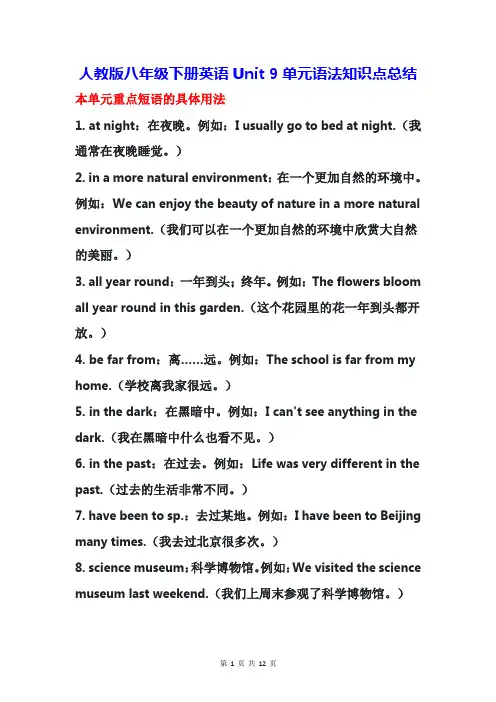
人教版八年级下册英语Unit 9单元语法知识点总结本单元重点短语的具体用法1. at night:在夜晚。
例如:I usually go to bed at night.(我通常在夜晚睡觉。
)2. in a more natural environment:在一个更加自然的环境中。
例如:We can enjoy the beauty of nature in a more natural environment.(我们可以在一个更加自然的环境中欣赏大自然的美丽。
)3. all year round:一年到头;终年。
例如:The flowers bloom all year round in this garden.(这个花园里的花一年到头都开放。
)4. be far from:离……远。
例如:The school is far from my home.(学校离我家很远。
)5. in the dark:在黑暗中。
例如:I can't see anything in the dark.(我在黑暗中什么也看不见。
)6. in the past:在过去。
例如:Life was very different in the past.(过去的生活非常不同。
)7. have been to sp.:去过某地。
例如:I have been to Beijing many times.(我去过北京很多次。
)8. science museum:科学博物馆。
例如:We visited the science museum last weekend.(我们上周末参观了科学博物馆。
)9. history museum:历史博物馆。
例如:The history museum has many interesting exhibits.(历史博物馆有很多有趣的展品。
)10. amusement park:游乐园。
例如:We had a great time at the amusement park.(我们在游乐园玩得很开心。
人教新目标英语八年级下册讲义—Unit 9 Have you ever been to a ……
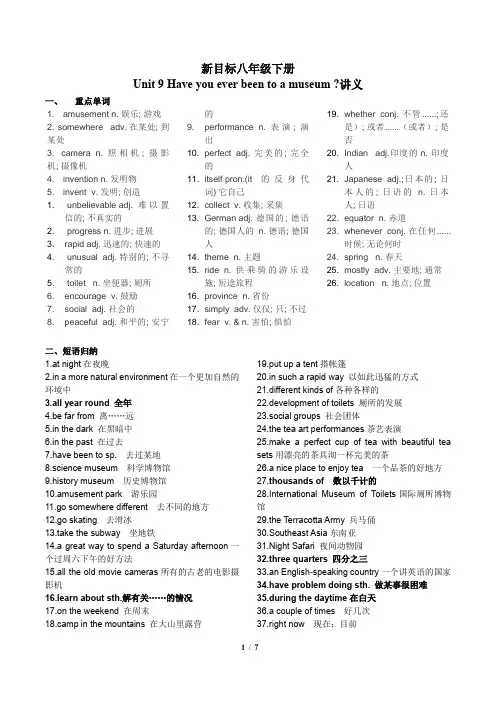
新目标八年级下册Unit 9 Have you ever been to a museum ?讲义一、重点单词1. amusement n. 娱乐; 游戏2. somewhere adv. 在某处; 到某处3. camera n. 照相机; 摄影机; 摄像机4. invention n. 发明物5. invent v. 发明; 创造1. unbelievable adj. 难以置信的; 不真实的2. progress n. 进步; 进展3. rapid adj. 迅速的; 快速的4. unusual adj. 特别的; 不寻常的5. toilet n. 坐便器; 厕所6. encourage v. 鼓励7. social adj. 社会的8. peaceful adj. 和平的; 安宁的9. performance n. 表演; 演出10. perfect adj. 完美的; 完全的11. itself pron.(it的反身代词) 它自己12. collect v. 收集; 采集13. German adj. 德国的; 德语的; 德国人的n. 德语; 德国人14. theme n. 主题15. ride n. 供乘骑的游乐设施; 短途旅程16. province n. 省份17. simply adv. 仅仅; 只; 不过18. fear v. & n. 害怕; 惧怕19. whether conj. 不管......;还是); 或者......(或者); 是否20. Indian adj.印度的 n. 印度人21. Japanese adj.;日本的; 日本人的; 日语的n. 日本人; 日语22. equator n. 赤道23. whenever conj. 在任何......时候; 无论何时24. spring n. 春天25. mostly adv. 主要地; 通常26. location n. 地点; 位置二、短语归纳1.at night在夜晚2.in a more natural environment在一个更加自然的环境中3.all year round 全年4.be far from 离……远5.in the dark 在黑暗中6.in the past 在过去7.have been to sp. 去过某地8.science museum 科学博物馆9.history museum 历史博物馆10.amusement park 游乐园11.go somewhere different 去不同的地方12.go skating 去滑冰13.take the subway 坐地铁14.a great way to spend a Saturday afternoon一个过周六下午的好方法15.all the old movie cameras所有的古老的电影摄影机16.learn about sth.解有关……的情况17.on the weekend 在周末18.camp in the mountains 在大山里露营19.put up a tent搭帐篷20.in such a rapid way 以如此迅猛的方式21.different kinds of各种各样的22.development of toilets 厕所的发展23.social groups 社会团体24.the tea art performances茶艺表演25.make a perfect cup of tea with beautiful tea sets用漂亮的茶具沏一杯完美的茶26.a nice place to enjoy tea 一个品茶的好地方27.thousands of 数以千计的28.International Museum of Toilets国际厕所博物馆29.the Terracotta Army 兵马俑30.Southeast Asia东南亚31.Night Safari 夜间动物园32.three quarters 四分之三33.an English-speaking country一个讲英语的国家34.have problem doing sth. 做某事很困难35.during the daytime在白天36.a couple of times 好几次37.right now 现在;目前38.an amusement park with a special theme一个有特别的主题的游乐园39.walk around the park 在公园里到处走40.hear of 听说41.take a ride兜风42.another province另一个省43.the Bird’s Nest鸟巢44.encourage sb. to do sth.鼓励某人做某事45.on the one hand... on the other hand.一方面,另一方面三、句型集萃1.a great way to do sth一个做某事的好办法2.It’s unbelievable that很难相信……3.watch sb do sth.看某人做了某事4.encourage sb to do sth鼓励某人做某事5.as..as和。
英语八年级下册unit9知识点
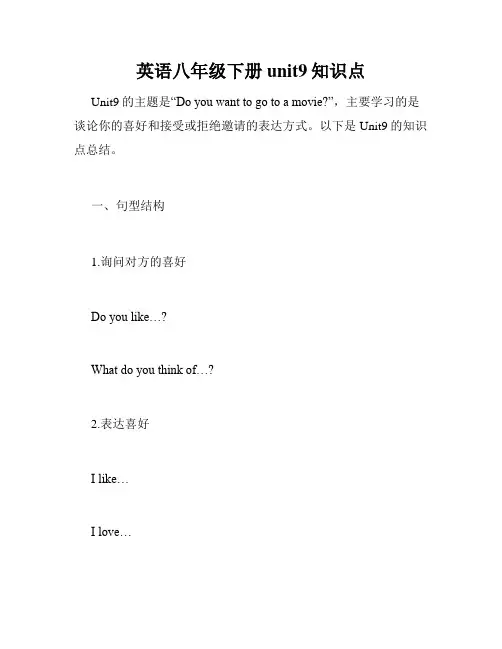
英语八年级下册unit9知识点Unit9的主题是“Do you want to go to a movie?”,主要学习的是谈论你的喜好和接受或拒绝邀请的表达方式。
以下是Unit9的知识点总结。
一、句型结构1.询问对方的喜好Do you like…?What do you think of…?2.表达喜好I like…I love…I’m crazy about…It’s my favorite.3.接受邀请Sure, I’d love to.That sounds great/good. I’d be happy/pleased to.4.拒绝邀请I’m sorry, but I can’t. I’m afraid I have to…Maybe another time.二、词汇1.电影genresaction movie 动作片comedy 喜剧drama 剧情片horror movie 恐怖片2.电影院cinema/movie theater3.邀请及回应invite and response Would you like to…? 你想要……吗?Can you…? 你能……吗?Do you want to…? 你想……吗?四、语法1.比较级和最高级形容词和副词在表示比较的时候,需要使用比较级和最高级。
从以下三个方面来比较:一般比较:as + 形容词/副词 + as比较级:形容词/副词 + er + than最高级:the + 形容词/副词最高级 + 名词2.情态动词情态动词可以用于表达建议、请求、命令、许可等意思。
can 可以could 能够may 可以might 可能should 应该shall 将will 意愿would 意愿五、表达技巧1.巧用缩略词在口语中,使用缩略词表达更为简洁。
I’d like to = I would like to = I wanna2.注意语调和语气语气是表达意图的关键所在,我们需要通过语调和语气来准确表达自己想要表达的情感。
八年级英语u9知识点
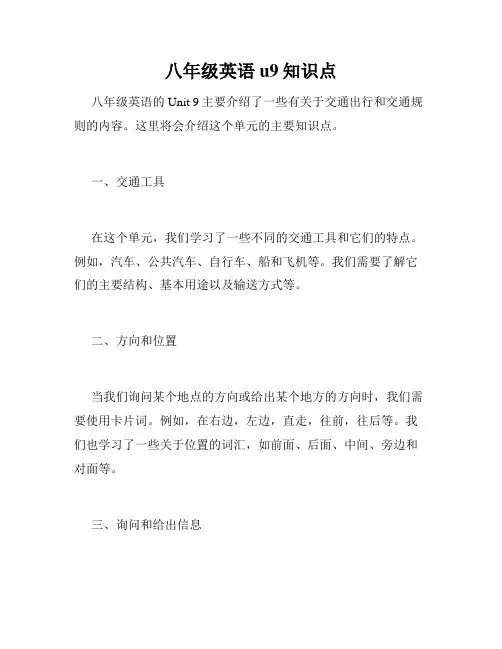
八年级英语u9知识点
八年级英语的Unit 9主要介绍了一些有关于交通出行和交通规则的内容。
这里将会介绍这个单元的主要知识点。
一、交通工具
在这个单元,我们学习了一些不同的交通工具和它们的特点。
例如,汽车、公共汽车、自行车、船和飞机等。
我们需要了解它们的主要结构、基本用途以及输送方式等。
二、方向和位置
当我们询问某个地点的方向或给出某个地方的方向时,我们需要使用卡片词。
例如,在右边,左边,直走,往前,往后等。
我们也学习了一些关于位置的词汇,如前面、后面、中间、旁边和对面等。
三、询问和给出信息
在交通出行中,询问方向、地点和其他相关信息非常重要。
因此,在这个单元,我们学习了一些有关如何有效地进行信息交流
的语言表达方法。
例如,如何向他人提问和回答问题,如何描述
位置,如何提供和请求帮助等。
四、指示词和冠词
在描述交通工具、位置和方向时,我们需要使用指示词和冠词。
这些词语能够帮助我们更清楚地表达意思,如this、that、these、those、a、an和the等。
五、交通规则
学习关于交通规则是出现意外事故和确保人身安全的关键。
在
这个单元里,我们学习了一些常见的交通规则,如穿过马路时如
何确保自己的安全,如何识别交通标记等等。
总结
通过学习这个单元,我们可以更好地了解有关交通出行及其相关信息的表达方法,同时学习了如何提供和请求帮助,如何保障自己的人身安全以及关于交通规则的知识。
这些知识点不仅适用于英语学习,也将对我们的日常生活有所帮助。
人教版八年级英语下册Unit9 Have you ever been to a museum知识点梳理及单元复习
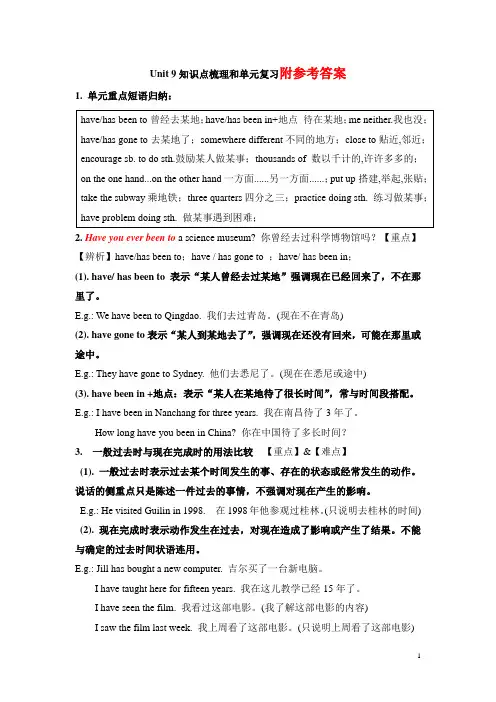
Unit 9知识点梳理和单元复习附参考答案1. 单元重点短语归纳:have/has been to曾经去某地;have/has been in+地点待在某地;me neither.我也没;have/has gone to去某地了;somewhere different不同的地方;close to贴近,邻近;encourage sb. to do sth.鼓励某人做某事;thousands of 数以千计的,许许多多的;on the one hand...on the other hand一方面......另一方面......;put up搭建,举起,张贴;take the subway乘地铁;three quarters四分之三;practice doing sth. 练习做某事;have problem doing sth. 做某事遇到困难;2. Have you ever been to a science museum? 你曾经去过科学博物馆吗?【重点】【辨析】have/has been to;have / has gone to ;have/ has been in;(1). have/ has been to 表示“某人曾经去过某地”强调现在已经回来了,不在那里了。
E.g.: We have been to Qingdao. 我们去过青岛。
(现在不在青岛)(2). have gone to表示“某人到某地去了”,强调现在还没有回来,可能在那里或途中。
E.g.: They have gone to Sydney. 他们去悉尼了。
(现在在悉尼或途中)(3). have been in +地点:表示“某人在某地待了很长时间”,常与时间段搭配。
E.g.: I have been in Nanchang for three years. 我在南昌待了3年了。
How long have you been in China? 你在中国待了多长时间?3. 一般过去时与现在完成时的用法比较【重点】&【难点】(1). 一般过去时表示过去某个时间发生的事、存在的状态或经常发生的动作。
人教版八年级下册英语 Unit 9单元知识点提纲
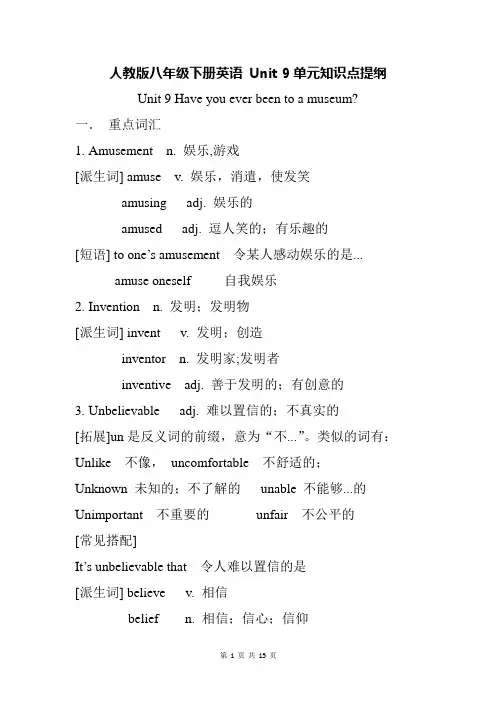
人教版八年级下册英语Unit 9单元知识点提纲Unit 9 Have you ever been to a museum? 一.重点词汇1.Amusement n. 娱乐,游戏[派生词] amuse v. 娱乐,消遣,使发笑amusing adj. 娱乐的amused adj. 逗人笑的;有乐趣的[短语] to one’s amusement 令某人感动娱乐的是...amuse oneself 自我娱乐2.Invention n. 发明;发明物[派生词] invent v. 发明;创造inventor n. 发明家;发明者inventive adj. 善于发明的;有创意的3.Unbelievable adj. 难以置信的;不真实的[拓展]un是反义词的前缀,意为“不...”。
类似的词有:Unlike 不像,uncomfortable 不舒适的;Unknown 未知的;不了解的unable 不能够...的Unimportant 不重要的unfair 不公平的[常见搭配]It’s unbelievable that 令人难以置信的是[派生词] believe v. 相信belief n. 相信;信心;信仰Believable adj. 可相信的,可信任的[常见搭配]Believe it or not! 信不信由你!Believe in sb./sth 相信某人或认可某事Seeing is believing. 眼见为实。
/百闻不如一见。
4.Progress n. 进步;进展v. 取得进步;取得进展;改进[常见搭配] make progress in (doing) sth. 在某方面取得进展注意:progress 前可以有great, much, a little等词修饰。
[派生词]progressive adj. 进步的;先进的;开明的Progression n. 发展;前进;进程5.Rapid adj. 快速的;迅速的Rapidly adv. 迅速地;快速地6.Unusual adj. 不同寻常的[注意]表示一个不同寻常的事/人时,要用不定冠词an,例如:an unusual experience 一次不同寻常的经历[联想] usual adj. 普通的,通常的Usually adv. 通常7.Encourage v. 鼓励,鼓舞[派生词] encouragement n. 鼓舞,鼓励[反义词] discourage v. 使泄气;使沮丧[常见搭配] encourage sb.to do sth 鼓励某人做某事。
八年级下册英语第九单元知识点笔记
八年级下册英语第九单元知识点笔记Unit 9: How do you make a plan?1. Vocabulary:- Schedule: a plan that shows what needs to be done and when it needs to be done.- Routine: a regular way of doing things.- Prioritize: to decide which tasks are most important and must be done first.- Deadline: a time by which something must be finished.- Procrastinate: to delay doing something that should be done.- Estimate: to guess or calculate a value or quantity by using available information.- Flexibility: the ability to change plans or approaches when needed.- Multitasking: the ability to do several things at the same time. 2. Grammar:- Infinitives: These are verbs that consist of "to" plus a base verb. They can be used as subjects, objects, or complements in a sentence.- Example: To study effectively requires dedication and discipline. - Gerunds: These are verbs that end in -ing and act as nouns in a sentence.- Example: Traveling is one of my favorite hobbies.- Modal verbs: These are auxiliary verbs that express a certain attitude or intention. They include "can, could, may, might, shall, should, will, would."- Example: We should finish our project by the deadline.3. Expressions:- Make a plan: to create a schedule or strategy for achieving a goal. - Stick to a plan: to follow a plan without deviation or distraction. - Be on track: to be making progress according to a plan or schedule.- Fall behind: to not make progress according to a plan or schedule. - Catch up: to work to regain progress that has been lost.- Get sidetracked: to be distracted or diverted from the main goal or task.- Put off: to delay a task or decision.- Deal with: to handle or attend to a situation or problem.4. Practical advice:- When making a plan, it's important to set realistic goals and consider potential obstacles.- Prioritizing tasks can help ensure that the most important work gets done first.- Having a routine and sticking to it can help establish good habits and increase productivity.- When estimating how long a task will take, it's better to overestimate rather than underestimate to avoid falling behind schedule.- Procrastination can be overcome by breaking tasks down into smaller, more manageable parts and setting achievable goals.- Multitasking may seem efficient, but it can actually decrease productivity and lead to mistakes. It's better to focus on one task at a time.。
Unit 9单元知识点人教版八年级英语下册
1. have been to sp“去过某地(已经回来了)”have gone to sp“去了某地(还没有回来)”2. 主语+too“某人也是”;主语+neither“某人/物也没有/不”3. so +助动词/情态动词/be动词+主语“某人也是”用于前文是肯定形式。
Eg:I like apples, so does she.“我喜欢苹果,她也是。
”4. neither+助动词/情态动词/be动词+主语“某人也是”用于对前文是否定形式。
Eg:I don't like apples, neither does she.“我不喜欢苹果,她也是。
”5. take a/an/the+交通工具+to +地点=go to+地点+by+交通工具。
Eg:I ’ll take the bus to the party.= I ’ll go to the party by bus.“我将会乘公交车去参加派对。
”6. How are we going to get there?“我们怎样到达那里?”7. be different from…“和……不一样”eg:Larry is quite different from me.8. be the same as… “和……一样”eg: Larry is the same as me.9. take a/an/the+交通工具+to +地点= go to+地点+by+交通工具。
Eg:I ’ll take the bus to the party.= I ’ll go to the party by bus.“我将会乘公交车去参加派对。
”10.someone, somebody something, anyone, anybody, anything, everyone, everybody, everything, no one, nobody, nothing 等均为不定代词,作主语是,谓语动词要用单数形式。
人教版英语八年级下册单元Unit 9 知识点+测试卷+思维导图
Unit 9 Have you ever been to a museum?1.重点词汇:camera, toilet, province, spring, fox, collect, encourage, fear, progress, rapid, peaceful, perfect, safe, unbelievable, unusual, social whenever, whether2. 短语归纳:1. tea art 茶艺2. tea set 茶具3. a couple of 两个;一对;几个4. thousands of 数以千计的;许许多多的5. on the one hand...on the other hand... 一方面……另一方面……6. all year round 全年7. be close to 离……近8. be far from 离……远3. 必背典句:1. -Have you ever been to a science museum? 你去过科学博物馆吗?-No, I’ve never been to a science museum. 没有,我从来没有去过一个科学博物馆。
2. -Have you ever visited the space museum? 你参观过太空博物馆吗?-Yes, I have. I went there last year. 是的,我有。
我去年去过那里。
3. -I’ve never been to a water park. 我从没去过水上公园。
-Me neither. 我也没有。
4.语法知识:have/has been to“主语+have/has been to+地点”表示“某人曾经去过某地”,暗含的意思是某人现在已经回来了,不在那里了。
1. have/has been to常与ever, never, once, twice, how many times等连用。
人教版八年级下册英语Unit9知识点学习资料
人教版八年级下册英语U n i t9知识点Unit9 Have you ever been to a museum?名词:camera 照相机;摄像机toilet 坐便器;厕所province 省份spring 春天fox 狐狸information 信息;资料invention 发明;发明物amusement 娱乐;游戏ride 供乘骑的游乐设施;短途旅程动词:encourage 鼓励collect 收集;采集形容词:unbelievable 难以置信的;不真实的rapid 迅速的;快速的unusual 特别的;不寻常的social 社会的peaceful 和平的;安宁的perfect 完美的;完全的safe 安全的;无危险的副词:simply 仅仅;只;不过mostly 主要的;通常数词:thousand 一千连词:whether 不管……(还是);或者……(或者);是否whenever 在任何……的时候;无论何时兼类词:progress v&n 进步;进展fear v&n害怕;惧怕Indian adj印度的 n印度人German adj德国的;德语的;德国人的 n德语;德国人Japanese adj日本的;日本人的;日语的 n日本人;日语短语:amusement park 游乐场tea art 茶艺tea set 茶具a couple of 两个;一对;几个thousands of 数以千计的;许许多多的all year round 全年on the one hand……on the other hand……一方面……另一方面……知识点:1、to one's amusement 令某人发笑的是to one's surprise 令某人吃惊的是to one's joy/happiness 令某人高兴的是To Tom's amusement, Lily and Jack are dancing and singing in the car. 令Tom发笑的是,Lily 和Jack在车里又唱又跳。
- 1、下载文档前请自行甄别文档内容的完整性,平台不提供额外的编辑、内容补充、找答案等附加服务。
- 2、"仅部分预览"的文档,不可在线预览部分如存在完整性等问题,可反馈申请退款(可完整预览的文档不适用该条件!)。
- 3、如文档侵犯您的权益,请联系客服反馈,我们会尽快为您处理(人工客服工作时间:9:00-18:30)。
八年级下册Unit 9知识点【单元目标】Ⅱ.目标句型:1. —Have you ever been to…?—Yes,I have. /No,I haven’t.2. I/He/She has / have never been to…3. Where have you been?4. Where do you want to go?5. How long have you been doing…?6. What do you like best about doing sth.?7. What kind of job do you want?8. How do/did you do sth.?9. How do you spell your name?Ⅲ.语法现在完成时A.表示过去发生或已经完成的动作对现在造成的影响或结果,或从过去已经开始,持续到现在的动作或状态。
如:The car has arrived.车子来了。
(结果:车子已在门口)Someone has broken the window.有人把窗户打破了。
(结果:窗户仍破着)现在完成时句子通常有recently,lately,since,for,in the past few months/years等词做时间状语。
肯定形式:have/has + done否定形式:have/has + not +done一般疑问句:have或has放于句首。
B.现在完成时的用法1)现在完成时所表示的动作在说话之前已完成,而对现在有影响。
所以常常后面不用时间状语。
现在完成时所表的动作离说话人的说话时刻可近可远。
如:He has gone to London. (说话人认为他不在该地)He has been to London. (说话人认为他在该地)2)现在完成时所表示的动作开始于过去,持续到现在,也许还会持续下去。
常用for和since表示一段时间的状语或so far,now,today,this week (month,year)等表示包括现在时间在内的状语。
例如:He has studied English for 5 years.He has studied English since 2001.Now I have finished the work.注意:表示短暂时间动作的词,如:come,go,die,marry,buy等的完成时不能与for,since等表示一段时间的词连用。
3)现在完成时还可用在时间和条件状语从句中,表示将来某时完成的动作。
例如:I’ll go to your home when I have finished my home work.If it has stopped snowing in the morning,we will go to the park.【重点词语】1.record(1)record作名词,表示“记录”This is a record of school attendance.这是一份学生考勤记录。
He kept a record of what the speaker sail.他把说话人所说的话都记录了下来。
(2)record作名词还可表示“有关某人或某物过去的已知事实;档案记录”。
He has an honorable record of service.他有光荣的服务记录。
(3)record作动词,表示“写出以作参考、记录”。
例如:The tape recorder has recorded his voice录音机已经录下了他的声音。
Listen to the speaker carefully and record what he says. 仔细听讲,然后记下他所说的话。
2. have been to表示“到(去)过某处”,现在已不在那个地方。
如:He has been to England.他曾到过英国。
(现在已经不在英国了)Have you ever been to the Great Wall?你到过长城吗?(现在已经不在长城上)have gone to表示“去了某处”,“到某处去了”,现在已不在说话的地点了。
如:He has gone to England。
他已去英国了。
(已经不在说话的地方,到达英国或者在去英国的路上)3. timen. [U] 时间,时候如:Time never stands still.时间不会停滞不前。
The time has come for us to speak out.是我们大胆讲话的时候了。
n. [C] 一段时间,时刻如:You have taken a long time writing the letter.你用了很长时间写这封信。
We had a good time together.我们一起度过了愉快的时光。
n. (多用复数)时代如:He is one of the best actors in modern times.他是现代最好的演员之一。
In Shakespeare’s time there were no actresses on the English stage.莎士比亚时代英国舞台上没有女演员。
n. 次;倍如:This is the first time that I have ever been abroad.这真是我第一次出国。
Your room is three times the size of mine.你的房间是我的三倍大。
注意:作“倍,次”,必须用于“三次(倍)”以上,一、二次(倍)用once,twice表示。
4. attract(1)用作及物动词,可直接跟名词或代词作宾语。
The noise attracted his attention.喧嚷声引起了他的注意。
(2)attract常用于be attracted to sb / sth结构,意为“喜爱某人或某物”。
I’m very attracted to her.我非常喜欢她。
5. discover(1)作“发现”讲时,作及物动词,后跟名词作宾语,指的是那些原来已存在的,但不为人知的物或事等They discovered him stealing public property.他们发现他盗窃公共财产。
Who discovered the America?谁发现了美洲?(2)discover还可意为“知道事实,答案”I soon discovered the truth.不久我便知道了真相。
6. one…the other表示“(两者中的)一个……另一个”,该短语是代词短语,强调两个当中的一个……另一个……。
注意其基数必须是两个。
I have two sister. One is a doctor, and the other is a teacher.我有两个姐姐,一个是医生,一个是老师。
Hold it in this hand,not the other.用这只手握着,不要用那只手。
7. for example表示“例如……”,该短语常用在句中作插入语,用于举例说明情况,可放在句首、句中或句末,但常用逗号与正文隔开。
常置于句首。
We feed many animals,for example,cows,pigs,dogs,horses etc.我们喂养很多的动物,例如奶牛、猪、狗、马等等。
For example,Jack Booth,a 21-year-old man,gave up his job in San Francisco Library a year ago.例如,21岁的杰克·布斯在一年前放弃了他在旧金山图书馆的工作。
For example,I know the film star Zhang Ziyi.譬如,我认识电影明星章子怡。
8. mean(1)mean作及物动词,意为“意思是,意味着”。
What does this word mean?这个单词是什么意思?(2)mean意为“意思是……”,还可跟that引导的宾语从句。
例如:The teacher meant that you must listen carefully in class.老师的意思是你上课必须认真听讲。
(3)mean还可意为“意味着……”,后跟动名词作宾语。
What he said means sending you to the hospital.他说的话得意思着要送你去医院。
(4)mean还可意为“打算,意图”,后跟动词不定式作宾语。
例如:I don’t mean to hurt you.我并无意伤害你。
What do you mean to do next?你下一步打算做什么?9. own(1)own意为“自己的,特有的”,常与名词所有格连用,起加强语气的作用。
It’s nice if I can have my own room.我要是能有自己的房间就好了。
(2)own作代词,意为“属于某人之物”,相当于一个名词性物主代词。
Those books belong to the library but this is my own.那些书是图书馆的,但这本是我自己的。
(3)own还可作动词,表示“拥有,有”。
We don’t rent our house; we own it.我们的房子不是租的,是我们自己的。
(4)own作动词,还可表示“承认,自白”。
He owned to have done it.他承认曾经干过这件事。
10. ask for表示“要求,请求”。
Bill did a lot for me without asking for any reward比尔为我做了许多事,没要任何报酬。
Don't serve water at meals unless someone asks for it.除非有人要,就餐时不要端水上去。
I've asked for an interview with the manager.我已请求与经理见面。
If you get into difficulties,don't hesitate to ask for advice.如果你陷入困境,应立即去请求建议。
If I had asked for direction,I wouldn't have lost my way.我要问一问方向的话,就不会迷路了。
【重难点分析】1.——Have you ever been to a water park?你曾去过水上公园吗?——No,I haven’t.不,没去过。
